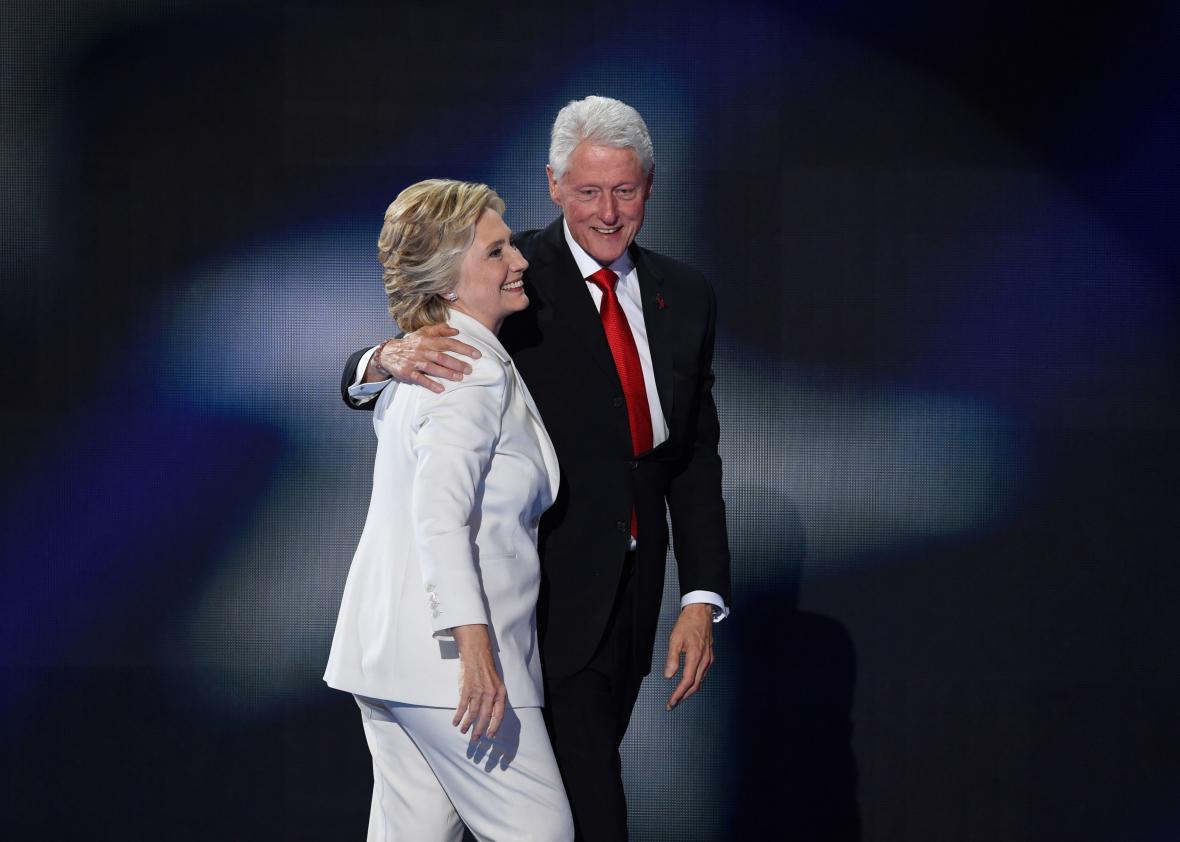Long before Donald Trump clinched the Republican nomination, he vowed that the ammunition he had stocked for Hillary Clinton would include constant reminders of her husband’s sexual misdeeds. Now, Trump appears to have won the support of the woman with perhaps the most disturbing allegations against Bill Clinton, Juanita Broaddrick, as Buzzfeed’s Katie J.M. Baker reports in a nuanced profile.
Broaddrick, who claims that Clinton raped her in 1978 when he was Arkansas’ attorney general, told Baker what she has always told reporters: that her animus toward the Clintons is personal, not political. But Baker found that as conservatives have embraced Broaddrick’s cause, she seems to have increasingly returned the favor. Broaddrick, who voted for Obama in 2008, “insists she has no plans to join Republican presidential nominee Donald Trump’s campaign and says she’s only voting for him because she doesn’t want the man she claims raped her—and the woman she believes enabled him—back in the White House,” Baker writes. But her public profile tells a different story. “She used to tweet mostly about her own story and other sexual assault–related issues; these days, her feeds are filled with outlandish Clinton conspiracy theories and angry posts about Benghazi.”
Broaddrick also granted her—slightly ambivalent—approval after the Trump campaign, without her permission, used her voice and story in an anti-Hillary attack ad. Though Broaddrick told Buzzfeed that she was “really hurt” when the Trump team pulled audio of her describing the alleged rape, fighting tears, in a 1999 Dateline interview, she said in a radio interview in May that she thought her role in the ad was “important,” and that she wasn’t “unhappy” that the clip was used.
For those who don’t remember the details of Broaddrick’s allegations against Clinton, here’s a brief refresher: Broaddrick, who met Clinton when he made a campaign stop at the nursing home where she worked, claims that she’d arranged to meet the then-attorney general in a coffee shop in Little Rock, but at the last minute he instead invited himself to her hotel room, where he raped her “like it was an everyday occurrence.” Broaddrick says she told a few friends at the time, but might never have come forward if lawyers for Paula Jones, the Arkansas state employee who sued Clinton for sexual harassment, hadn’t heard about her through word-of-mouth and subpoenaed her in 1998. At the time, Broaddrick signed an affidavit swearing that Clinton had not raped her—hoping, she says now, “to stay out of it.” When Clinton was impeached the next year, however, and federal prosecutor Ken Starr reached out to Broaddrick, she testified the opposite. Ultimately, she agreed to do the 1999 Dateline interview, hoping to lend her voice to the clamor for impeachment.
Starr deemed Broaddrick’s claims “inconclusive,” and the Dateline interview didn’t air until after the impeachment proceedings had ended. In the end, Broaddrick’s testimony didn’t stick to Bill Clinton’s presidency—but it lingered in the air after his time in the White House had ended. As Lisa Myers, the Dateline reporter who interviewed Broadrrick for NBC News, told Baker: “No one can objectively look at Juanita’s story and not be troubled.”
According to Trump—and to Broaddrick herself—voters should be especially troubled to see Hillary Clinton, wife of an accused rapist, running an openly feminist campaign. One New Hampshire voter asked her in December, “You say that all rape victims should be believed. But would you say that about Juanita Broaddrick, Kathleen Willey, and/or Paula Jones?” Clinton replied stiffly: “Well, I would say that everybody should be believed at first, until they are disbelieved based on evidence.” Baker reports that, in the months following this incident, Clinton’s campaign seemingly tinkered with its website focused on the issue of campus sexual assault. A block quote on the page once read: “I want to send a message to every survivor of sexual assault: Don’t let anyone silence your voice. You have the right to be heard. You have the right to be believed, and we’re with you.” The final sentence has since disappeared.
There’s a long history of wives being called to account for their husband’s sins, as Rebecca Traister has written at New York magazine—and Hillary Clinton has more experience than anyone with that particular American instinct. As Michelle Goldberg wrote for Slate in December, “I don’t think for a moment that the people who hope to use Broaddrick against Hillary care about victim blaming. And it would be a profound sexist irony if these accusations, having failed to derail Bill Clinton’s political career, came back to haunt his wife.” Of course, irony doesn’t begin to capture the glaring dissonance between Trump’s enthusiastic support of Broaddrick and his own reportedly violent history with women: His ex-wife Ivana has accused him of rape, though she later disavowed the statement. It’s telling that Trump has had so little trouble painting Clinton as a hypocrite while presenting himself as Broaddrick’s long-awaited advocate. Often, what a powerful man can brush off, a woman must contend with for the rest of her life. Juanita Broaddrick may know that better than anyone.
